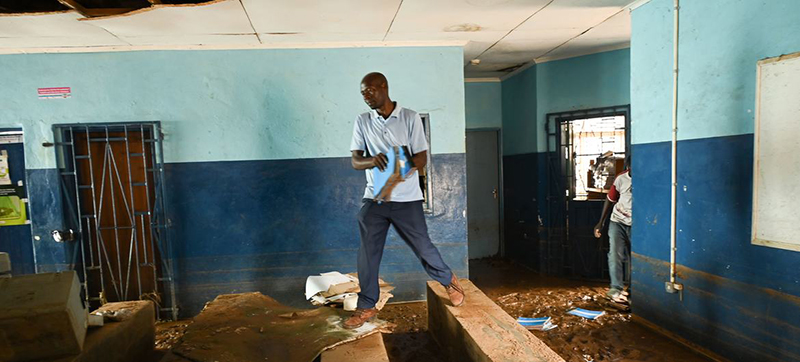 Cyclone Freddy
Cyclone Freddy New York: Southern African countries hit hard by tropical Cyclone Freddy are reeling from disease outbreaks, with health services stretched to the limit, the World Health Organization (WHO) said on Thursday.
The devastation caused by the cyclone in Madagascar, Malawi and Mozambique has increased the spread of cholera and malaria, as well as malnutrition.
Meanwhile, more than 300 health facilities have been destroyed or flooded in the three countries, limiting health care access.
The cyclone’s destruction increased public health risks including a surge in the spread of cholera, malaria, malnutrition, COVID-19, and other vaccine-treatable diseases.
WHO said that Malawi was still in the midst of its “worst-ever” cholera outbreak, although cases are declining. In Mozambique, cholera cases have more than doubled over the past week, to almost 2,400.
“With a double landfall in less than a month, the impact of Cyclone Freddy is immense and deepfelt”, said Dr Matshidiso Moeti, World Health Organization (WHO) Regional Director for Africa.
“While we work to understand the full extent of the devastation, our priority is to ensure that affected communities and families receive health assistance for immediate needs as well as to limit the risks of water-borne diseases and other infections spreading,”
Helping communities prepare for climatic hazards
Overall, flooding, and torrential rains have affected more than 1.4 million people in the three countries. WHO and partners are providing support in the form of cholera treatment centers, medical supplies, and health worker training.
WHO has provided U$7.9 million and sent over 60 experts to the affected countries to assist with the emergency response.
Around 184 tons of important medical supplies have been shipped to support the cyclone and cholera emergency response. In Malawi, WHO has redistributed cholera response operation centres to hotspot districts, to help disease control efforts.
“With the rise in climate-related health emergencies in Africa, it’s clear that more needs to be done to bolster preparedness to climatic hazards so that communities can better cope with the impacts of the devastating natural disasters,” said Dr Moeti.
The cholera outbreaks are currently affecting 14 African countries and are being made worse by extreme climate events and conflicts that leave countries more vulnerable. Many people have been forced to flee their homes, to face uncertain living conditions.
Support Our Journalism
We cannot do without you.. your contribution supports unbiased journalism
IBNS is not driven by any ism- not wokeism, not racism, not skewed secularism, not hyper right-wing or left liberal ideals, nor by any hardline religious beliefs or hyper nationalism. We want to serve you good old objective news, as they are. We do not judge or preach. We let people decide for themselves. We only try to present factual and well-sourced news.







